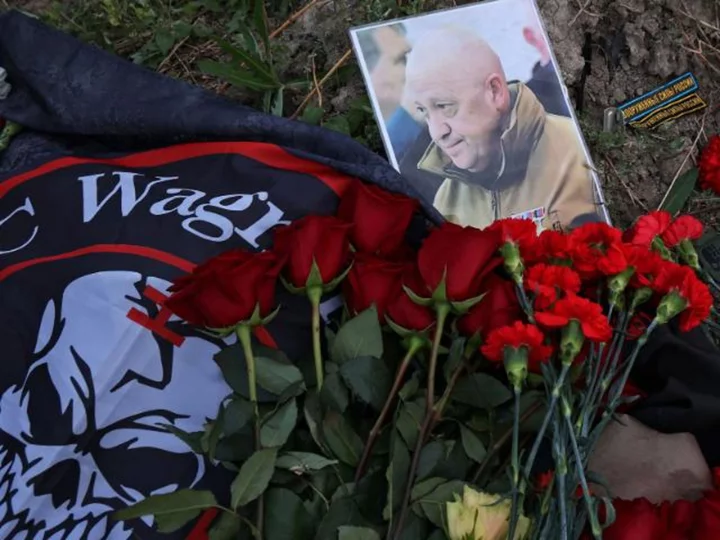The wreckage of Yevgeny Prigozhin's Embraer private jet has been cleared from the crash site, and the flight recorders have been recovered, but the metaphorical smoke has yet to clear in Moscow after the presumed death of the Wagner mercenary boss.
We still do not know what brought down Prigozhin's Embraer Legacy 600 -- expert analysis points to the possibility of an explosion -- and we may never know. To use an inexact term, the biggest black box in this aviation catastrophe is Russian President Vladimir Putin's apparatus of state, which is not known for its transparency.
That in turn points to a much bigger question: How will the Russian landscape change after the exit of the man who presented the most serious challenge to Putin's rule in over two decades?
Putin has offered his own hot take, obliquely referencing Prigozhin's contributions to the war on Ukraine.
"I knew Prigozhin for a very long time, since the early '90s," Putin said Thursday. "He was a man of difficult fate, and he made serious mistakes in life, and he achieved the results needed both for himself and when I asked him about it - for a common cause, as in these last months. He was a talented man, a talented businessman."
But the real message Putin was sending, after waiting a full day after the crash, appeared directed toward Russia's elite: mistakes can be fatal.
The Kremlin has vehemently denied speculation that the Russian state might have been involved in the crash.
"All this is an absolute lie," Kremlin spokesman Dmitry Peskov said. "Now, of course, there is a lot of speculation around this catastrophe and the tragic death of the passengers of the plane, including Yevgeny Prigozhin."
But not everyone is likely to be persuaded. Back in July, following Prigozhin's abortive mutiny, US President Joe Biden joked at a press conference that if he were Prigozhin, "I'd be careful what I eat, keep my eye on my menu."
Jokes aside, Biden was making a serious point. The march on Moscow by Prigozhin's men was a direct threat to the state and a personal affront to Putin, who has long cultivated a tsar-like image of masterliness and near-infallibility.
So, who would dare stick their head over the parapet now? Any aspiring Prigozhins — and there seem to be none on the immediate horizon — are likely to be mindful of crossing real or perceived red lines.
It's worth remembering that Prigozhin never had particularly high name recognition in Russia, at least certainly not before the full-scale invasion of Ukraine. But the Wagner group's successes on the battlefield raised his public profile, and Russian state television heaped praise on his Wagner fighters for capturing the shattered eastern Ukrainian city of Bakhmut.
That changed in late June after Wagner's march on Moscow raised the unsettling possibility of civil war in Russia. Prigozhin may have cast the mercenary rebellion as a "protest," but the uprising seriously dented his prestige. The independent pollster Levada-Center conducted a survey in July that found that Prigozhin's public approval had plummeted after the abortive uprising.
But that doesn't mean Prigozhin had no loyal constituencies. The Wagner group's actions were followed closely by a coterie of nationalistic bloggers, and Prigozhin — who recruited fighters from Russian prisons and used the same salty language as convicts — appeared to have commanded the respect of many of his fighters.
So does Prigozhin's apparent demise threaten to mobilize his followers, presenting a potential challenge to the state? At this stage, no. Wagner fighters were offered to sign contracts with the regular military after their uprising and Igor Girkin, a hardline ultranationalist who had openly criticized Putin, found himself in jail. The precedents have been set.
Fans and supporters of Prigozhin were not dissuaded from laying flowers outside Wagner headquarters in St. Petersburg, Russia's second city and the hometown of both Putin and Prigozhin, after Wednesday's crash. CNN's Matthew Chance even witnessed one of the gruesome mementos at the scene: a sledgehammer, the symbol of Wagner's brutality, nestled among the floral bouquets.
But bouquets — as well as sledgehammers — can be cleared away. It's worth recalling a political assassination that shook Russia to her core in 2015, the murder of charismatic opposition Boris Nemtsov, who was gunned down within view of the Kremlin. Nemtsov's admirers continued for years to leave flowers at the spot on the bridge where he was killed. Local authorities always swept the flowers away, and no permanent memorial stands to the slain politician
Nemtsov's nonviolent supporters were a very different class of people than Prigozhin's rifle-toting foot soldiers in Ukraine and elsewhere: Nemtsov, who had been investigating Putin's secret war in eastern Ukraine when he was killed, was the face of Russia's embattled liberal activism.
Alexey Navalny, who succeeded Nemtsov as Russia's most galvanizing opposition leader, is currently in a Russian prison colony, along with many others who have peacefully opposed Putin's war on Ukraine. In a post from prison on Prigozhin's death, which he speculated was Putin's own doing, Navalny warned that the Kremlin leader had laid the foundation for a possible civil war in Russia.
"These are the ingredients used to create the dish called 'civil war,'" he wrote. "They created a gang. Armed the gang. Disbanded the gang. Killed the leaders."
No evidence has surfaced that points to the involvement of the Kremlin or Russian security services in the crash. But Prigozhin's life and fate have laid bare the fissures within the paranoid, vengeful gerontocracy that rules Russia.

